
Most of us these days are extremely stressed out. Be it the troubles of our own everyday life, or the state of the world upsetting us – the truth is that life is difficult and it is hard not to be affected by it all. Especially for highly sensitive people who are prone to anxiety – it can mean the difference between a productive day and a non-productive one. That is where the concept of inner peace is useful.
Most of us have heard this phrase, yet few of us know what it means. And even fewer know how to attain it. So, let us figure out what this alien entity is, why you should start working towards it today, and how you can attain it.
What is Inner Peace?
SUMMARY
Inner peace refers to developing a peaceful state of mind despite the presence of stressors, and not just in their absence.
According to Wikipedia, inner peace or peace of mind is a state of being in which the psychological and spiritual state of a person is calm despite the presence of stressful elements in the environment.
In this definition, it should be noted that inner peace means being calm ‘despite’ the presence of stressors, not just in their absence. This suggests that inner peace may not take away all your problems, but it does give you strength to deal with them. Being at peace means that your mind is performing at an optimal level.
Inner peace is the opposite of stress and anxiety. It is also associated with happiness, bliss, and contentment. We all know that life is not a bed of roses and there will always be stressful elements, but inner peace means calmness and satisfaction in the presence of all these elements. This way of living helps us attain lasting happiness.
In many cultures, especially Southeast Asian cultures like Buddhism, inner peace is also known as the state of consciousness or enlightenment achieved by various types of training, like meditation, yoga, tai chi, breathing exercises, prayer, etc. Several spiritual practices all over the world also referred to inner peace as a way of knowing oneself.
Generally, people have a lot of difficulties attaining inner peace because the stressful elements of everyday life get the best of them. Inner peace is the result of a long and arduous process, which requires attention and mindfulness every single day.
The importance of inner peace has been emphasized by the Dalai Lama in the following quote:
“The question of real, lasting world peace concerns human beings, so basic human feelings are also at its roots. Through inner peace, genuine world peace can be achieved. In this the importance of individual responsibility is quite clear; an atmosphere of peace must first be created within ourselves, then gradually expanded to include our families, our communities, and ultimately the whole planet.”
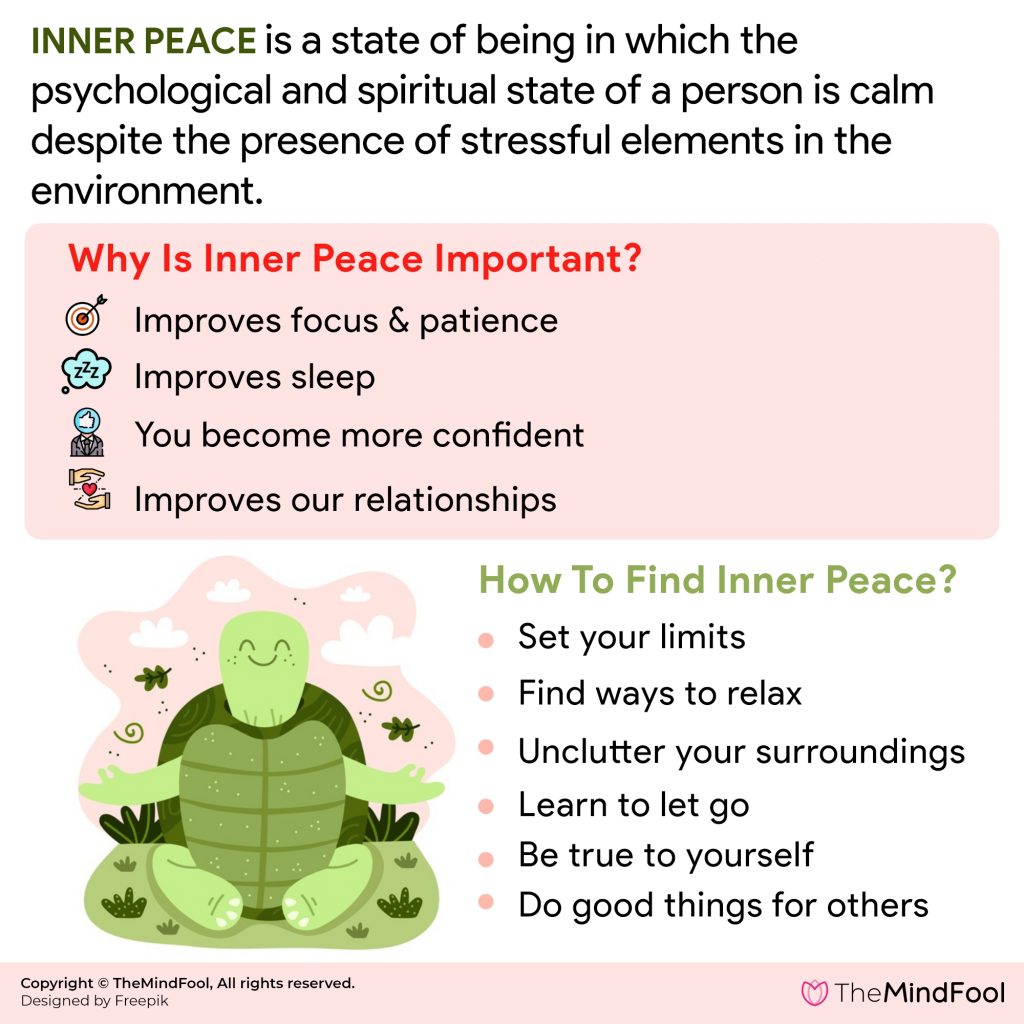
Why is Inner Peace Important?
Here are the most important reasons why you should strive towards attaining inner peace:
1. Inner peace improves focus
There are too many distractions in the world that can cause needless anxiety and worries. As a result, we tend to lose focus on our loved ones and our own self. Inner peace is a healthy coping mechanism that can turn this anxiety into productive actions while maintaining focus on what’s important for us.
2. It improves tolerance and patience
Inner peace teaches us how to be more patient and tolerant when we are faced with opposing views, negative situations, or conflicts. Attaining inner peace equips us to understand the situation in a better way and figure out solutions.
3. Inner peace improves sleep
Most of the people in the modern world have trouble sleeping, because our minds are buzzing all the time. Inner peace helps us cope with this stress and anxiety, and focus on slowing down. It also helps you in retraining your mind to shut down the constant chatter. This enables our brains to rest at the end of the day and prepare us for a good night’s sleep.
4. It encourages mindfulness and helps us experience the profound joy
Inner peace also encourages us to be mindful of the small blessings in life and enjoy the simple things, like, a long walk in nature, the texture of your food, the notes of the symphony in a song. Moreover, a lack of stress and anxiety and the constant mental chatter also allows us to experience the happiness and joy in everyday life in a deeply profound manner.
5. Inner peace improves our relationships
When we feel good about ourselves, we also tend to treat the world around us in a better way. People who have attained inner peace will have more positive interactions with the people around them as well.
6. It teaches you to take things one at a time
When you approach a massive project or a big task, it can be slightly overwhelming because you tend to keep thinking about how much is left to do. Inner peace allows you to take things one step at a time, and break down a huge task into smaller pieces. This helps us achieve even the most difficult things easily.
7. Inner peace improves your health
When you achieve inner peace, you will stop seeing processed foods and alcohol as an escape. This will slowly show a positive effect on your health and wellness. And ultimately, improved health gives you strength to be more peaceful and calm – which creates a positive feedback loop, helping both your physical and mental health.
8. You gain control over your own life
Inner peace teaches you how to gain control over aspects of your life that you previously believed were out of your control. As you get closer to achieving inner peace, you start to realize that you can change your lifestyle and habits. As a result, you’re no longer a slave to your own unhealthy coping mechanisms.
9. You become more confident
You start believing in yourself and your ability to do things that you previously thought were impossible. Challenging tasks and hurdles in the workplace or personal life become achievable and you start gaining more confidence in yourself. This will help you both professionally and in your personal life as well.
10. You become more content with life with Inner peace
The very definition of inner peace is not being perturbed by the events of the world. When you start accepting losses and unfortunate events as a part of life without feeling the need to suppress them, you find satisfaction. When your flaws and limitations become irrelevant, you get closer to contentment.
Why Is It So Difficult To Maintain Inner Peace?
SUMMARY
We fail to recognize that inner peace is not a quick fix. We will need to undo years of conditioning to achieve this state of mind and you will need to work on it continuously to maintain it.
1. Difficult to achieve

First of all, just knowing what inner peace and happiness mean is only the first step to attaining it. It is quite difficult to achieve this state of mind, and although most of us know of this concept and can even preach others about it, it is quite difficult to achieve it in our own lives.
The reason why people find it difficult to maintain inner peace is that just finding it is not enough. You also have to learn how to keep it, because everyday life has potential stressors that can disturb the state of mind.
An example:
Think of it like cleaning your room. Everyday life events like working, cooking, eating, and sleeping may not allow you enough time to keep your room clean. But one day you decide that you are going to clean it. However, the very next day, you go back to the same old habits and within a week, your room is back to the same messy state.
The problem with this type of attitude is that it is not enough to just clean your room once in a while, you also have to keep it clean consistently. To that end, you have to develop certain habits and behaviors that ensure that your room doesn’t get trashed every single week. And you have to enforce these habits even if you are extremely busy during the weekdays.
Your mind is exactly like your room. You have to develop and reinforce habits that maintain your inner peace. You have to practice these habits every single day, especially at times when there are stressors disturbing that inner peace.
2. Repression of emotions

The second reason why many people find it difficult to have inner peace is that we all tend to run towards quick fixes whenever there is a conflict. Instead of dealing with the negative thoughts and emotions associated with the situation, we distract ourselves with things like food, Netflix, or alcohol. But this does not make the sadness and negative emotions go away. They just return the next time with an even heavier intensity.
And then we go back to the coping mechanisms again. The cycle continues until either there is a big breakdown or you developed mental health issues like anxiety and depression. We fail to realize that quick fixes are fleeting in nature, and that is why most of us fail to find inner peace all our lives.
How To Find Inner Peace?
You can start your journey towards finding inner peace by following the below-mentioned steps. However, it should be noted that maintaining inner peace is an ongoing journey and you will need to commit to it every single day to achieve lasting happiness.
Here are some practical tips to help you in this journey:
1. Set your limits

Most of the time, we are not really busy, we just do not know how to set the limits. Minimize the clutter in your life and in your mind by telling yourself to stop. For instance, if you check social media only because you want to know what is going on with your friends, set a limit to how many times you will check during the day.
Limit your time on unnecessary activities, so you have more time for what you really want to do.
2. Find ways to relax

This can be deep breathing, progressive muscle relaxation, yoga, or meditation. All these activities ensure that you take the time to empty your brain of the endless chatter and instead spend some time focusing on the here and now.
Mindfulness accompanied by deep breathing will slow down your heart rate and also stabilize your blood pressure. This will help calm you and your mind to process life at a gentle pace.
3. Don’t make a mountain out of a molehill

Do not make an issue bigger than it needs to be. Don’t make a fuss about unnecessary things. If you feel yourself worrying about something, ask yourself if this is something that will matter 5 years down the line. Force yourself to think of the bigger picture. You will realize that most of the time, we are making things worse than they actually are – purely due to our irrational reaction to it.
The result of restraining yourself from this will be apparent very quickly. You will realize that this is one of the biggest contributors of stress to our life, and if we can change it, we are ever closer to inner peace.
4. Slow down

Allow yourself a few minutes every day to slow down and calm your mind and body. Being frantic and running around like a headless chicken all the time has extremely negative effects on your mind and body. And the slowing down principle applies to your thoughts as well. Take some time out to slow down the chatter in your mind every once in a while.
5. Unclutter your surroundings

To free up your mind, you also need to free up the space around you. If your desk or your house is a mess, you will find it difficult to focus on the work at hand. It is possible that your focus may also be divided into working and cleaning. Moreover, the Tasker time may also be delayed because you’ll be spending a lot of time searching for things.
Clutter and messy surroundings have a negative effect on our mind, whether or not we realize it. Make your environment relaxing and calm, and soon you will find that your thinking reflects the same calmness as well.
6. Focus on minimalism

This point is related to the previous one. It is very easy to remain clutter free if you take a minimalist approach to your everyday life. Take time to deep clean your house every once in a while. Donate things you do not want. Remove the unnecessary distractions from your surroundings to encourage clarity of mind and thought.
7. Practice promptness

This is a small habit, but it has a huge effect on our schedule. When you make an effort to organize your time in such a way that you are 5 minutes early to a meeting, instead of five minutes late, it gives you some time to relax and recharge.
It also takes away the stressful period Just wondering if you’re going to be late. Being prompt also gives you enough time to make changes in your schedule if there is an unforeseen happening.
8. Learn to let go

For many of us, the past is not a pleasant place to be. Most people on earth have experienced some form of trauma or hardship. However, staying in the past does not allow us to move forward. No matter how negative things were, how horrible someone was to you, or how bad the situation was, you need to learn how to let go.
Accept the current situation. Thinking about it over and over will not change anything. Also, instead of repressing such thoughts and emotions, let them come and go. This is how they will start to lose their power over you and you will learn to live in the present moment.
9. Do not assume

Oftentimes, what causes the most stress in relationships is assumptions. Even though we all know that none of us can read minds, we still try it. And all it causes is stress, anxiety, uncertainty, and misguided actions, and a headache for everyone.
So, instead of assuming things the next time, try to ask what the other person wants. This will save both of you a lot of time and energy in the long run.
10. Take a break

Take some time out to escape from your routine. Now, escaping doesn’t mean you are running away from something, it just means that you are taking time out to recharge your mind and body. It can be anything – some workout, meditation, soul searching, watching your favorite movie, or simply a walk in nature.
11. Avoid procrastination

When you postpone a task that you know you have to do sooner or later, what you are essentially doing is adding on the stress of the task in your mind until you actually do it. So now you will be spending extra time and energy thinking about that task than You would have if you had completed it on time. This is, of course, a complete waste of your time.
Learn the value of each minute and try to enjoy it. Do not give in to laziness or procrastination. Start doing things at the right time and release the underlying stress associated with that task. Remember, the longer you take the completed task, the worse your mental state gets, destroying any inner peace.
12. Step away from work when at home

This is especially true in the modern scenario where work and home have lost all boundaries. Remember that your work should not spill over into your family time. Leave it behind when it’s family time or your time.
Make sure that your weekends are dedicated to recharging yourself, whether it is by connecting with friends and family or practicing your own hobby.
13. Meditate
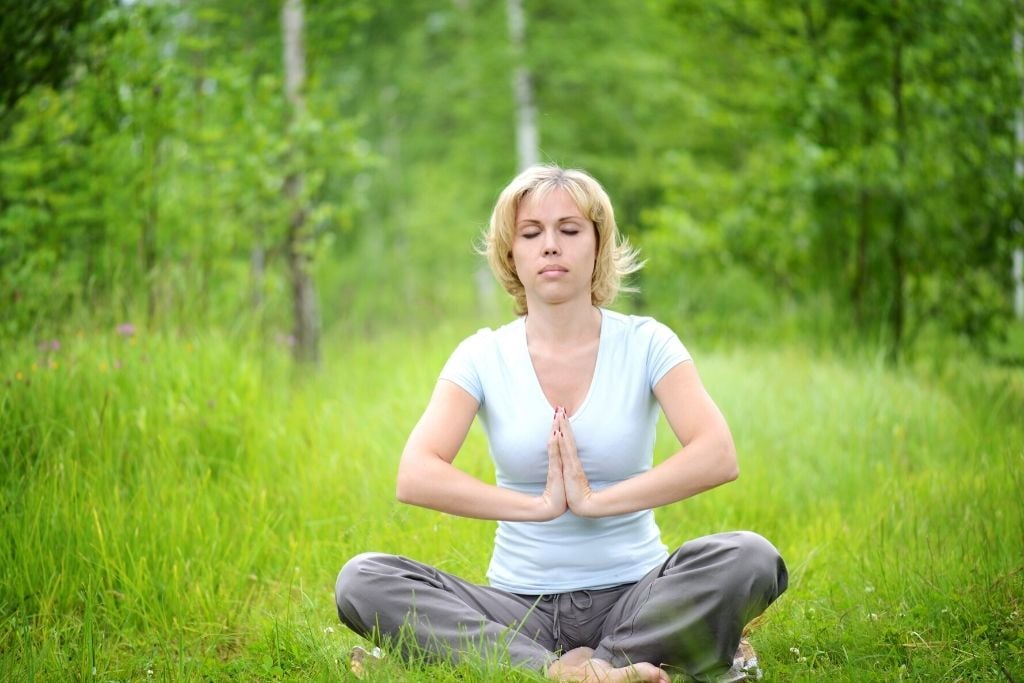
One of the most popular ways to experience inner peace and mindfulness is meditation. You don’t have to spend a lot of time doing it – just a couple of minutes every single day is more than enough.
It will reconnect you with your inner self and give new meaning to your experiences. It may be difficult to do it initially, but very soon you will find that it is indeed a life-changing experience.
14. Measure your words before you speak

The biggest enemy of our inner peace is the endless jibber jabber that goes on in our everyday life. How many times during the day do you find yourself talking about things that you don’t care about at all? And how many times do you say things did actually mean something to you?
Ask yourselves this:
Are your conversations actually important? Are you spending your time gossiping about other people? Or are you just talking about meaningless things like reality TV?
The goal is not to stop talking at all. The goal is to be mindful of the things we say. Because if our conversations don’t mean anything, all we’re doing is adding to the already existing noise in our brains, which is the biggest hurdle to your inner peace.
Learn to speak only out of necessity, truth, or kindness.
15. Focus on things you can control, not what you cannot
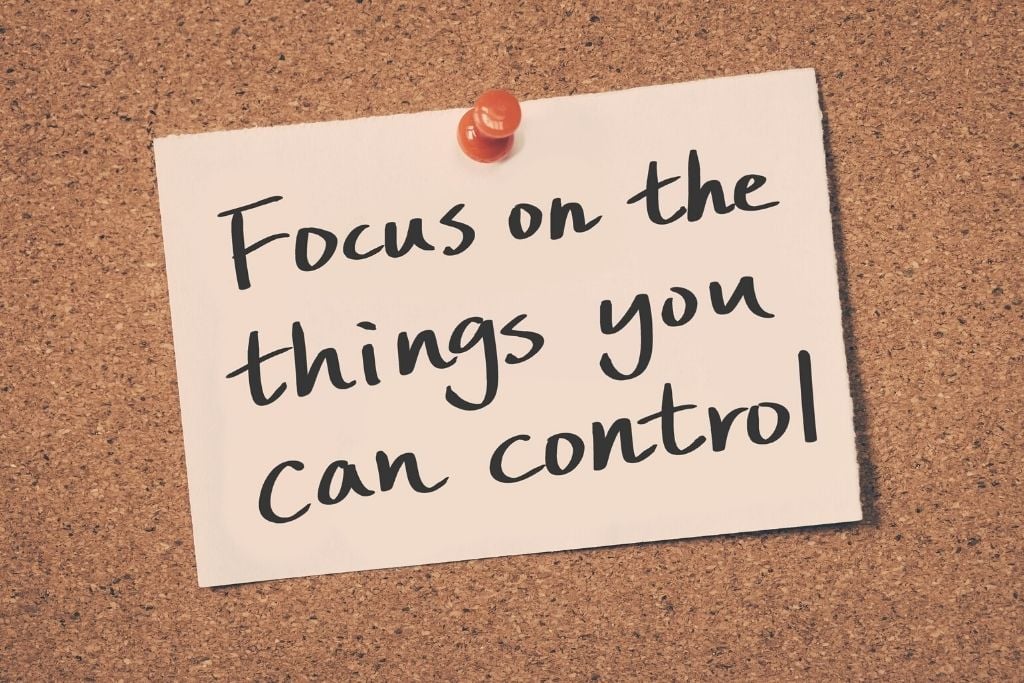
Oftentimes, we spend a lot of time worrying about the reactions of other people or certain instances that are completely out of our control. Always remember that the only thing in the world that you have control over is yourself.
So there is no point spending time and energy over a pursuit as fruitless as Actions and thoughts of other people. This will only stress you out and disturb your inner peace.
16. Spend some time in nature

The reason original humans had a lot more inner peace then us is because they weren’t closed off in Their bedrooms day in and day out. Plan a trip into nature every once in a while. It can be something as small as a walk in the park, or a camping trip over the weekend.
Being out in nature, listening to birds and trees, and breathing in The fresh air is a great way to find some peace and calm.
17. Be true to yourself

Make sure that your life is true to the values you believe in. There is nothing more regretful than a life that is full of pretensions. Too often, we let society dictate our values and choices. We do things to impress others, not because they give us happiness.
This leads to an internal cognitive dissonance, which creates turmoil in life and makes you unhappy. Most of the people are not even able to identify why they are unhappy in such cases, as they fail to recognize the problem.
Learn to make decisions based on what is important to you, not what your social conditioning tells you.
18. Watch what you eat and exercise

Conduct A small experiment. Just for a week, eat the way that you know you are supposed to, Nord how you want to. Make a note of the changes you feel in your body. You will see that not only do you feel much better about yourself, but the overall quality of your daily life also improves.
Research has proved that healthy food can actually improve our memory and increase focus. Similarly, exercise has a net positive effect on our body and brain. When these two practices are combined, you will notice a dramatic change in your thought processes and a sense of inner peace engulfing you.
19. Do good things for others

Every once in a while, take focus off of yourself and do something for someone else. It can be something as simple as helping a friend move or donating to an organization or cause that you feel passionate about. You will notice that then you do good for others, you also feel a sense of satisfaction, pride, and peace in your mind.
Another thing worth keeping in mind is that when you do good things for other people – also learn to let it be for the sake of doing it, not for getting any favors in return. Because when you do that, all you are doing is setting yourself up for further disappointment.
20. Establish your boundaries and stick with them

When it comes to relationships with other people, the reason most of us get into conflicts is that we don’t set boundaries. Whether it’s a platonic friend or a romantic partner, you need to be open With your boundaries. Tell them what is acceptable for you and what is not. If there is a boundary violation, Tell them that you will not accept it, and if the same is repeated in the future, kick these people out of your life.
In the long run, this will help you curate a group of friends that respects your boundaries and this will dramatically help you with reducing drama in your life and attaining inner peace.
21. Be assertive
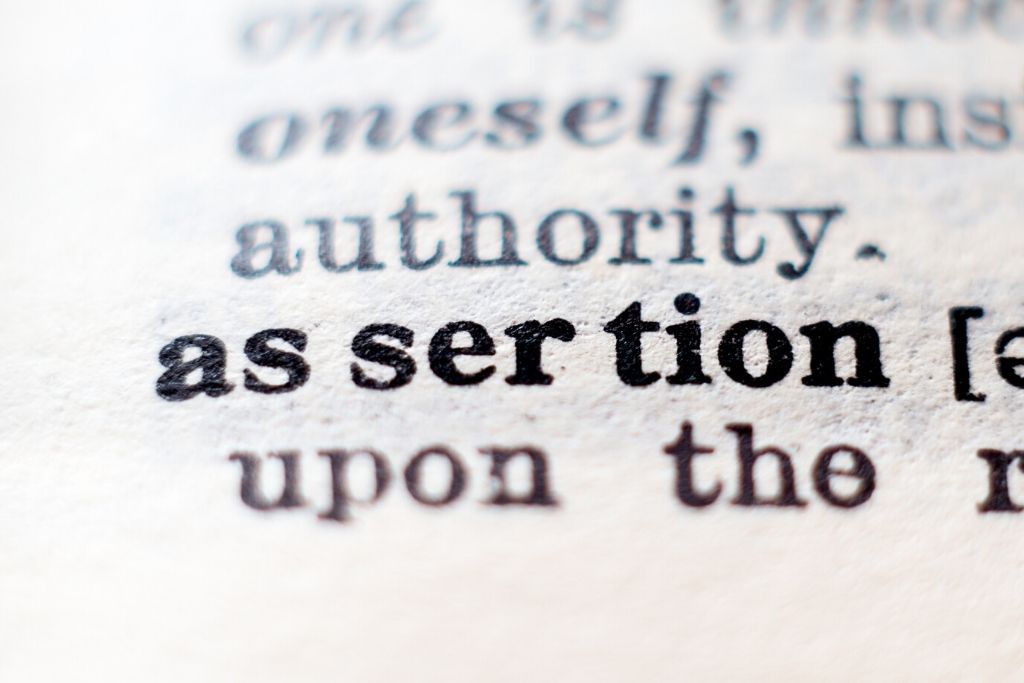
Just as with boundaries, you also need to be clear with your desires and needs. Being passive and waiting for the other person to guess what you want will not only create a lot of drama, but also leave you with less control. This runs opposite to the notion of inner peace.
If you are in a romantic relationship, let your partner know clearly what you expect and want from the. This covers your emotional and physical needs, as well as your long term plans. Too often, people in relationships cause each other pain simply because they refuse to be assertive about their own desires.
And most importantly, when you recognize that your partner is not fulfilling your needs and desires, have the courage to walk away. It may be painful at first but soon you will realize it is the best thing you have done for yourself.
22. Accept other people fully, warts and all

For a lasting sense of inner peace, accept that people around you will make mistakes and sometimes those mistakes will affect you. When you have already mentally prepared yourself for this, you will feel less pain and frustration when the mistakes actually happen.
In the long run, This will help you maintain A neutral attitude and a peaceful state of mind even in the face of conflicts.
23. Practice radical self acceptance

Just as with others you also need to remember that you are a human being who will also make mistakes at times. You have flaws and limitations, but they don’t define you. This is a crucial step toward developing inner peace, as it will prevent you from falling into the trap of chasing perfection.
24. Develop a steady hand

In uncertain times, and in the face of difficulties, learn to remain calm and collected. Because life will always throw curve balls at you. All you can do is separate yourself emotionally and learn how to make objective decisions even when you’re under stress.
This is especially important for people who are in positions of power and have a high-stress job. Separating yourself emotionally from your work can do wonders for your career.
25. Have faith in yourself
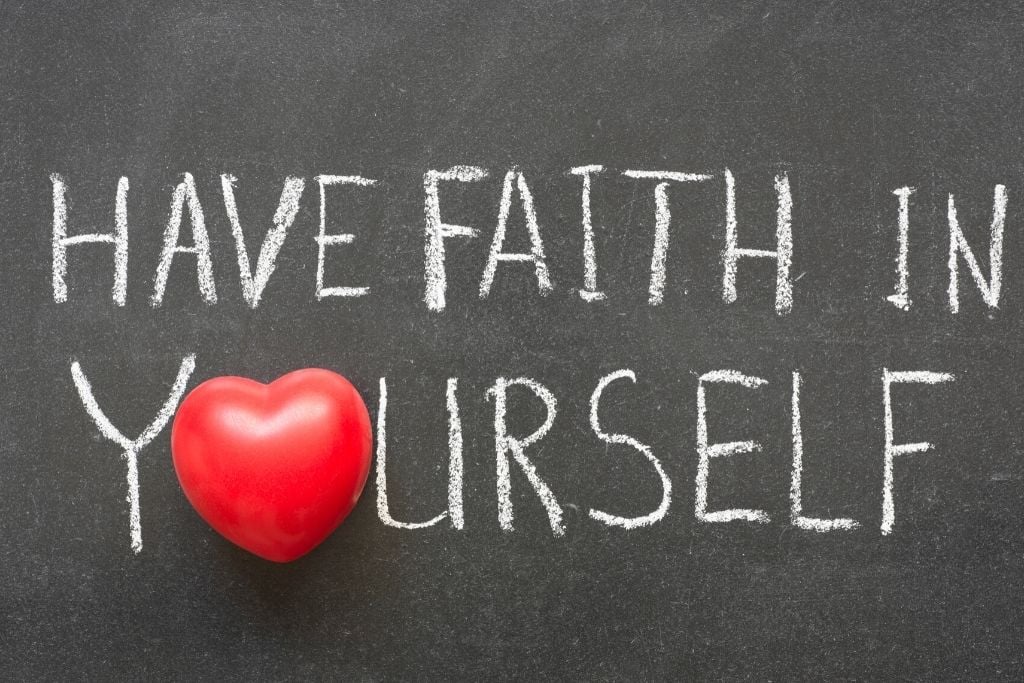
This is probably the most important part of the recipe. Believe that you can Be better and remain Unbothered even in the most difficult situations. Having confidence in yourself, knowing that no matter what life throws at you, you can handle is the biggest prerequisite for developing inner peace.
Buddhist Inner Peace Symbols
Buddhism is filled with values like inner peace, compassion, and wisdom. Here are the five symbols described in the religion that are related to inner peace:
1. The Lotus flower
This flower is a symbol of humankind and human life. It symbolized the inner battles we face and how we have to rise above the material pursuits and suffering to experience inner peace, nirvana and oneness.
You can read more about the meaning of the flower here.
2. The Dharma Wheel
The Wheel has now become a symbol for Buddhism itself. It also represents Buddha and the Noble path. The eight spokes of the wheel stand for the eightfold path talked about in Buddhism.
When we follow these eight steps, we achieve freedom from the cycle of rebirth and suffering and attain inner peace, calmness, and wisdom.
3. The Eternal Knot
The knot symbolizes the connection of everything in the universe. The lines of the know show us how everything in the world was created and how we are all linked to each other.
It also symbolizes the amalgamation of compassion and wisdom in everyday life. When we accept our link to other beings on Earth, we attain inner peace, wisdom, and nirvana.
4. The Two Golden Fish
For many people, the golden fish symbolize luck and fortune, but they also have a spiritual meaning. They stand for courage and fearlessness in the face of difficulty, and how if we swim through the waters of suffering, we will get to the calm waters of hope, courage, and inner peace.
5. The Bodhi Tree
Bodhi Tree is extremely important according to Buddhist teachings. It is believed that Buddha attained nirvana under this tree. It is now a symbol for his victory over material pursuits and suffering. Therefore, it now brings hope, salvation, faith, and inner peace in our lives.
Inner Peace Symbols in Yoga
Inner peace plays an important role in yoga and meditation as well. Here are the most important symbols for it in these practices:
1. Aum
This is one of most sacred and powerful Hindu mantras. It is a symbol of the sound of the universe and its consciousness. During meditation, repeatedly chanting this sound can help you gain focus, and in the long run, continuous chanting of this mantra can help with inner peace, a stronger connection with the universe, and mental bliss.
2. Mandalas
The colorful, intricate Mandalas are often seen as a symbol of balance, peace, wholeness, and harmony. It also reminds us that all human beings are connected to each other and it teaches us on how to find connectedness with the entire universe.
You can read more about Mandalas and their effects here.
3. Hamsa
The Hamsa is a universal representative of the five senses and the chakras that Hinduism talks about. According to this philosophy, each finger on the hand stands an element:
1. The Thumb – fire element
2. Index – Air element
3. Middle finger – Space element
4. Ring finger – Earth element
5. Pinky finger – Water element
In Buddhism, the Hamsa hand also symbolizes the Hand of God. When all the elements combine together, they become one with the universe. In the same way, when we integrate with all the parts within us, we attain inner peace.
4. Chakras
Chakras refer to the energy of our body, also known as aura. In our bodies, there are seven chakras:
- Base or Root Chakra (Muladhara)
- Sacral Chakra (Swadhisthana)
- Solar Plexus Chakra (Manipura)
- Heart Chakra (Anahata)
- Throat Chakra (Vishuddha)
- Third Eye Chakra (Ajna)
- Crown Chakra (Sahasrara)
Each Chakra has its own mental and spiritual significance. To achieve inner peace, we must balance all seven of our chakras, and this can be done through many ways, including yoga and meditation.
Prayer for Inner Peace
Here is the Prayer For Inner Peace | Christian Prayers For Inner Peace, Healing, and Happiness
A Prayer for Peace Within
Inner Peace Tattoo
Tattoos are a great way of reflecting your inner thoughts & getting it carved in your body like a blank canvas. Before getting a tattoo, never go by the latest trend, as you might get bored with it or the trend vanishes. Go by what your heart feels & what will it depict about you.
Here are some of the inner peace tattoo ideas –
Inner Peace Quotes
1. “Learning to distance yourself from all the negativity is one of the greatest lessons to achieve inner peace.”
Roy T. Bennett
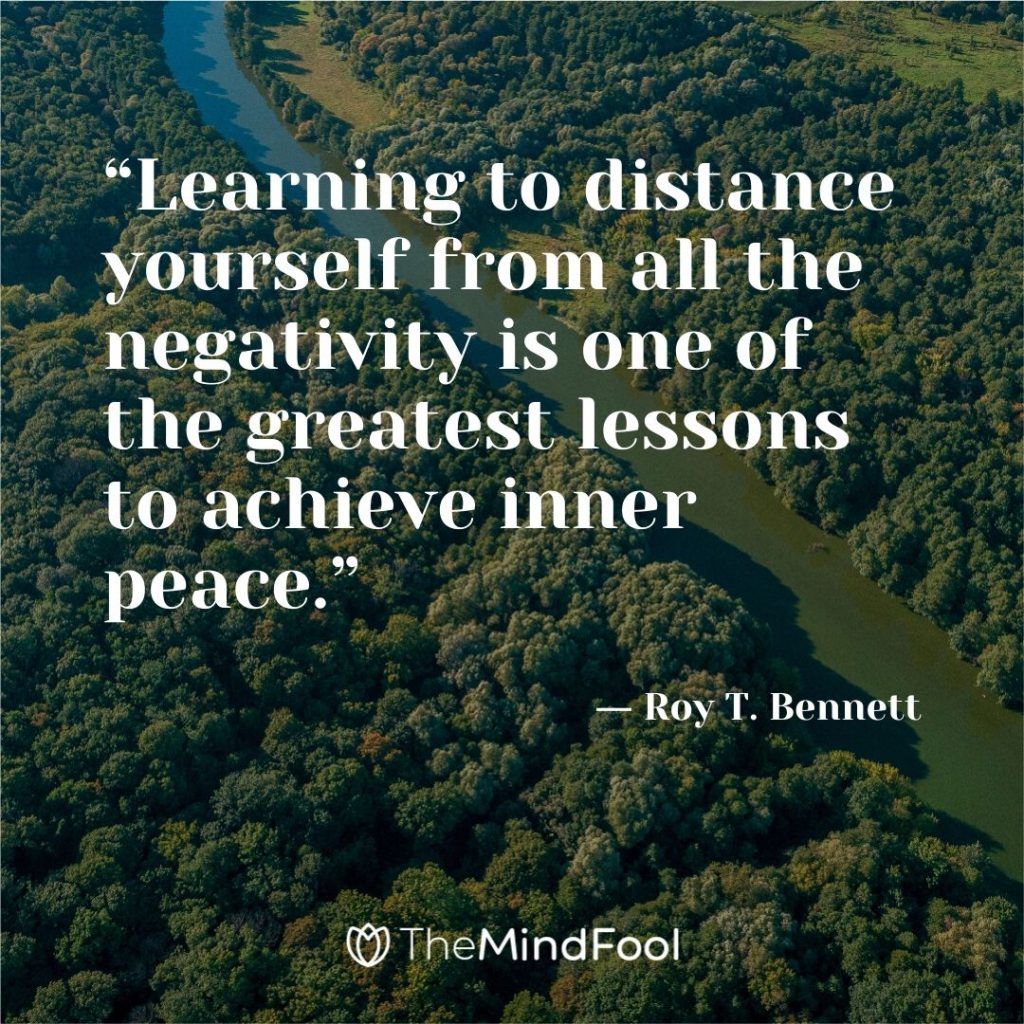
2. “We can never obtain peace in the outer world until we make peace with ourselves.”
Dalai Lama XIV
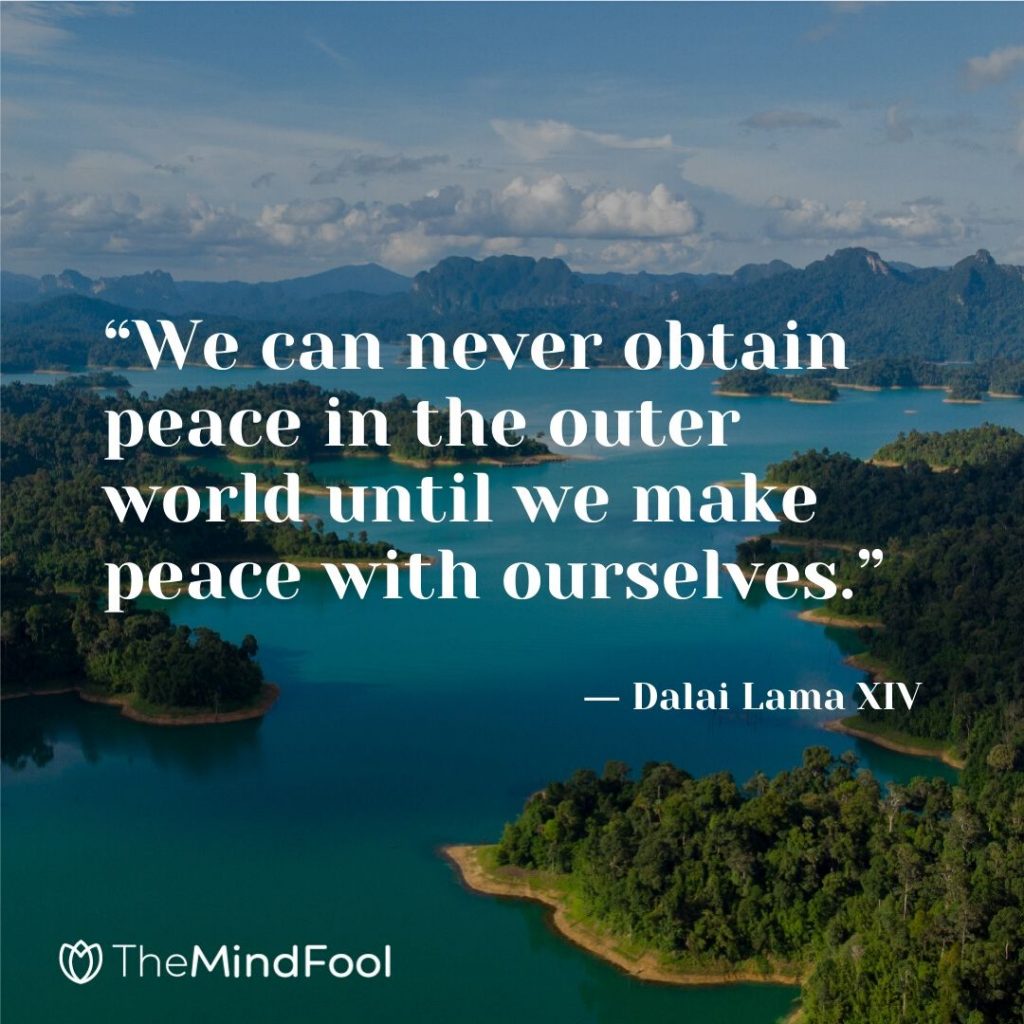
3. “Each one has to find his peace from within. And peace to be real must be unaffected by outside circumstances.”
Mahatma Gandhi
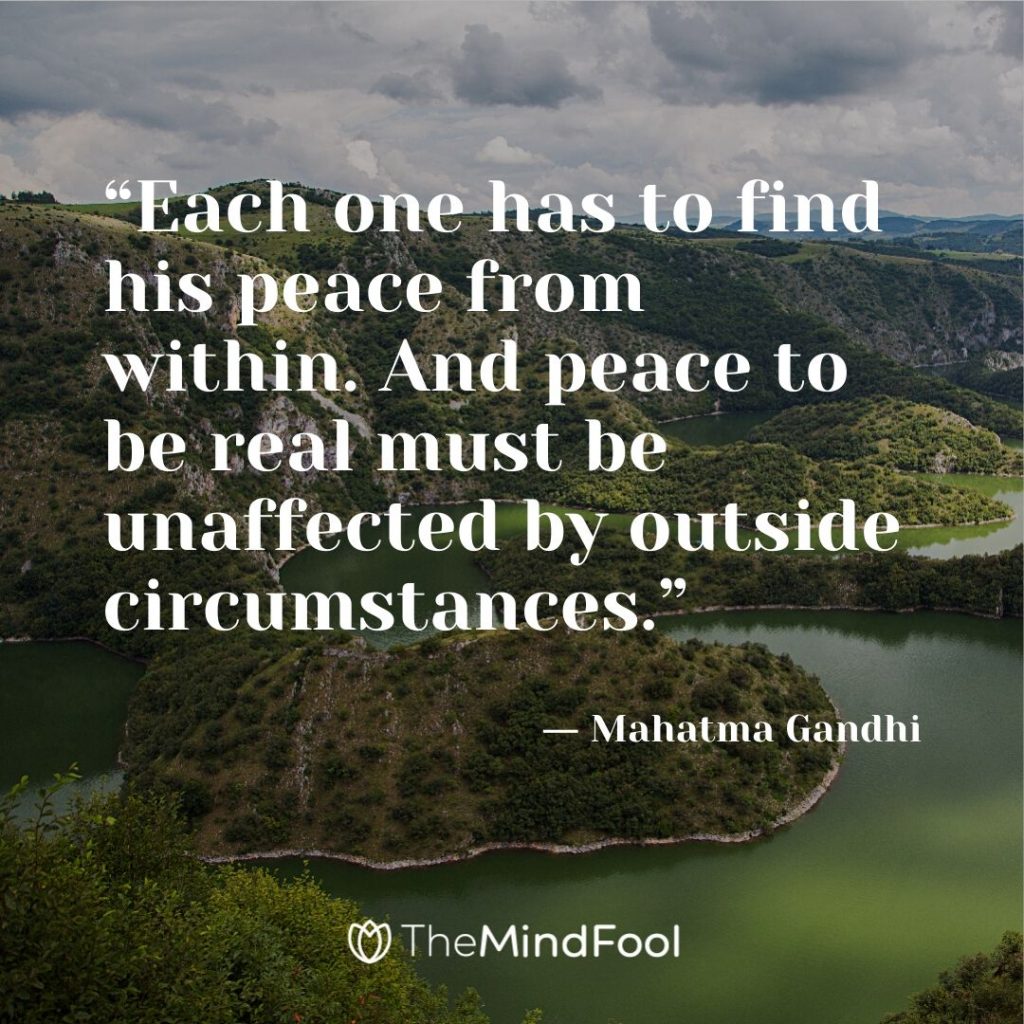
4. “Inner peace can be reached only when we practice forgiveness. Forgiveness is letting go of the past, and is therefore the means for correcting our misperceptions.”
Gerald G. Jampolsky
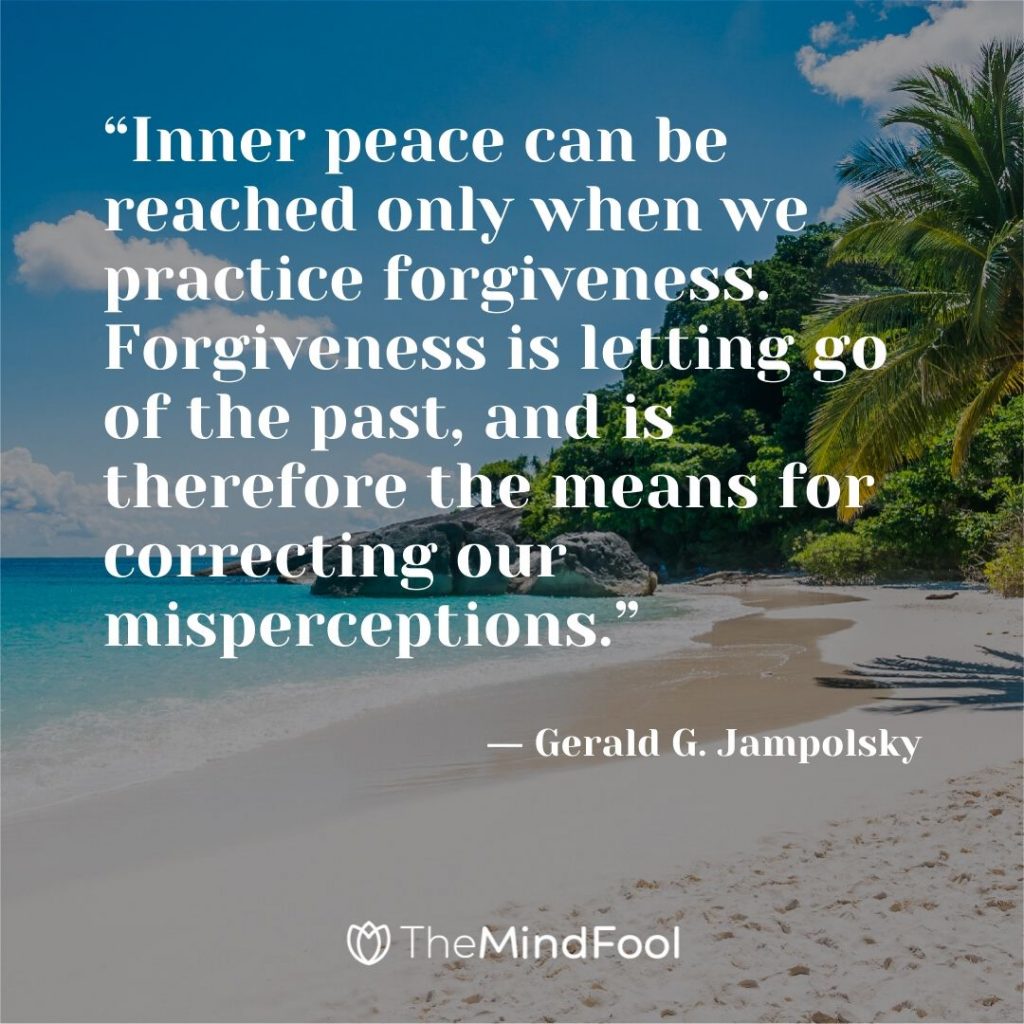
5. “The nearer a man comes to a calm mind, the closer he is to strength.”
Marcus Aurelius

Inner Peace Buddha Quotes
6. “Those who are free of resentful thoughts surely find peace.”
– Buddha

7. “One’s mind finds no peace, neither enjoys pleasure or delight, nor goes to sleep, nor feels secure while the dart of hatred is stuck in the heart”
– Buddha

8. “Do not overrate what you have received, nor envy others. He who envies others does not obtain peace of mind.”
– Buddha

9. “Better than a thousand hollow words, is one word that brings peace.”
– Buddha

10. “Resolutely train yourself to attain peace.”
– Buddha

For more quotes on inner peace, please read our article on – 101 Inner Peace Quotes
Closing Thoughts
Change starts from within. No amount of external stimulus or reading will give you inner peace. First, you have to decide that you are going to commit to this arduous process and then you have to develop an action plan on how you are going to implement the advice offered in this article
In addition to everything else, it is recommended that you take some time out to enjoy the peace your mind has attained in this journey. Allow yourself to notice the silence and calm, and let it wash away all the negativity and pain in life. Soon, you will come to enjoy this process and it won’t seem so hard anymore.
Surabhi has a deep passion for words. She puts her heart and mind into whatever she pursues and craves for creative ventures. She has always been keen on creating original content that can make a difference. In her experience as a content writer, she has had the opportunity to work on several fields with Psychology being her favorite. Surabhi says, words have the power to transform the world, better than a sword. So she hopes to contribute her bit to this revolution. At TheMindFool, she feels lucky to have the opportunity to share content capable of bringing about a change in the lives of the readers.
